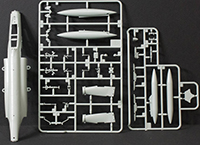
Academy 1/72 F-4J Phantom II 'VMFA-232' Kit First Look
By Michael Benolkin
| Date of Review | January 2018 | Manufacturer | Academy |
|---|---|---|---|
| Subject | F-4J Phantom II 'VMFA-232' | Scale | 1/72 |
| Kit Number | 12556 | Primary Media | Styrene |
| Pros | Easy construction, nice detailing | Cons | Nothing noted |
| Skill Level | Basic | MSRP (USD) | $42.00 |
First Look
 |
 |
 |
 |
Unlike most military aircraft developments, the F4H was a company-funded development that initially did little to interest the US Navy. Nevertheless, the Navy started warming to the idea of a powerful carrier-based all-weather interceptor. First flown in May 1958, the prototype displayed impressive performance with the help of its twin afterburning J79 engines. The Phantom II was born.
Developed as the guided missile interceptor the F4H, later re-designated as the F-4, featured a powerful intercept radar, a two-man crew, and up to eight guided missiles. This aircraft was supposed to make the air-to-air gun obsolete. That didn't happen, but that's another story. Typical loadout for the aircraft was four IR-guided AIM-9 Sidewinders on the inboard stations, four radar-guided AIM-7 Sparrow missiles in semi-recessed bays under the fuselage, and three external fuel tanks, two on the outboard stations and one centerline.
The Navy operated a limited number of F-4As for a brief time while their preferred initial configuration, the F-4B was under production. Combat experience and advancements in avionics and engine technology led to the next USN version - the F-4J. The F-4J featured the new AWG-10 radar, the J79-GE-10 engines, slatted tail surfaces and drooped ailerons.
Like the F-4B, the F-4J saw combat over Vietnam. The F-4J would soldier on for quite a few years. The aircraft received defensive avionics upgrades that were visible as fairings along the top of the intakes but still retained the F-4J designation. Another round of upgrades included a slatted wing and airframe strengthening, but these upgrades would cause these modified F-4Js to be redesignated as F-4S.
Academy has reissued their 1/72nd scale F-4J Phantom II kit, this time with markings for VMFA-232 'Red Devils' stationed out of MCAS Iwakuni in the mid-1970s. When Academy first released this kit, it featured MCP (multi-colored plastic) to allow the model to be built without paint. You can see our build of the kit here. This time, the kit is molded in gray styrene and presented on eight parts trees plus one tree of clear parts. The surface detailing is finely scribed with no signs of mold flash. Among the features and options:
- Basic cockpits
- One-piece windscreen/canopies (closed)
- J79 engine faces at end of intake ducts
- Positionable landing gear
- Positionable speed brakes
The kit includes the following external load options:
- 2 x triple ejector racks
- 6 x Mk.82 500 pound bombs
- 4 x AIM-9 Sidewinders
- 4 x AIM-7 Sparrows
- 2 x 370 gallon outboard external tanks
- 1 x 600 gallon centerline tank
The kit provides markings for the following aircraft:
- F-4J, 153791, VMFA-232, WT/1, Iwakuni AB, 1974
- F-4J, 155801, VMFA-232, WT/3, Iwakuni AB, 1974
- F-4J, 153818, VMFA-232, WT/7, Iwakuni AB, 1974
While AMS modelers will want to add some details into the cockpits and ejection seats, this kit is engineered to be buildable by less experienced modelers. Most modelers will also want to paint their models but Academy is doing a nice job producing kits that will appeal to newer or lesser-skilled modelers.
My sincere thanks to MRC for this sample!







